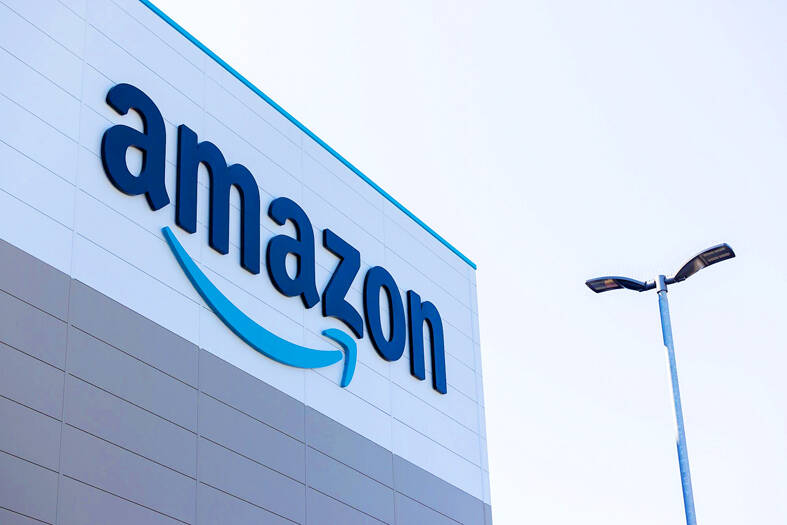Amazon.com Inc’s cloud-computing unit on Tuesday announced updated versions of its in-house computer chips while also forging closer ties with Nvidia Corp — dual efforts designed to ensure it can get enough supplies of crucial data-center processors.
New homegrown Graviton4 chips will have as much as 30 percent better performance than their predecessors, Amazon Web Services (AWS) said at its annual re:Invent conference in Las Vegas. Computers using the processors are to start coming online in the coming months.
The company also unveiled Trainium2, an updated version of a processor designed for artificial intelligence (AI) systems. It will begin powering new services starting next year, Amazon said. That chip provides an alternative to so-called AI accelerators sold by Nvidia — processors that have been vital to the build-out of AI services.

Photo: Bloomberg
However, Amazon also touted “an expansion of its partnership” with Nvidia, whose CEO, Jensen Huang (黃仁勳), joined AWS CEO Adam Selipsky on stage.
AWS is to be the first big user of an updated version of that company’s Grace Hopper Superchip, and it will be one of the data-center companies hosting Nvidia’s DGX Cloud service.
The new in-house chips are part of AWS’s push to maintain its lead over Microsoft Corp’s Azure and Alphabet Inc’s Google Cloud Platform. Earlier this month, Microsoft announced its own processors and AI accelerators. Like Amazon, it has pointed to the efficiency that they bring compared with buying off-the-shelf parts from traditional sellers such as Intel Corp.
AWS said that it has built more than 2 million Graviton processors since beginning the project about five years ago. All of the top 100 of its users of EC2 — AWS’ family of processing power for rent — have chosen to use Graviton-based computing, the company said.
“By focusing our chip designs on real workloads that matter to customers, we’re able to deliver the most advanced cloud infrastructure to them,” AWS vice president Dave Brown said. “Graviton4 marks the fourth generation we’ve delivered in just five years. And with the surge of interest in generative AI, Trainium2 will help customers train their machine learning models faster, at a lower cost and with better energy efficiency.”
Amazon faces a delicate balancing act. Although it is keen to tout the technological prowess of its new chips, the company also needs to maintain its relationship with Nvidia. Getting sufficient supply of Nvidia products has become a status symbol in the technology industry, with figures such as Larry Ellison and Elon Musk boasting about their ability to get the chips.
For now, Nvidia’s products are considered the industry’s best. Until Trainium or other alternatives can match their capabilities, companies like Amazon cannot afford to alienate Nvidia — and catching up will not be easy. Nvidia’s prized H100 chip is getting a more advanced update called H200 in the first half of next year, followed by a whole new design later in the year.
AWS will also operate a supercomputer based on Nvidia hardware. When not in use for internal research and development, the “supercluster” will be made available to other users as a service.

SETBACK: Apple’s India iPhone push has been disrupted after Foxconn recalled hundreds of Chinese engineers, amid Beijing’s attempts to curb tech transfers Apple Inc assembly partner Hon Hai Precision Industry Co (鴻海精密), also known internationally as Foxconn Technology Group (富士康科技集團), has recalled about 300 Chinese engineers from a factory in India, the latest setback for the iPhone maker’s push to rapidly expand in the country. The extraction of Chinese workers from the factory of Yuzhan Technology (India) Private Ltd, a Hon Hai component unit, in southern Tamil Nadu state, is the second such move in a few months. The company has started flying in Taiwanese engineers to replace staff leaving, people familiar with the matter said, asking not to be named, as the

The prices of gasoline and diesel at domestic fuel stations are to rise NT$0.1 and NT$0.4 per liter this week respectively, after international crude oil prices rose last week, CPC Corp, Taiwan (台灣中油) and Formosa Petrochemical Corp (台塑石化) announced yesterday. Effective today, gasoline prices at CPC and Formosa stations are to rise to NT$27.3, NT$28.8 and NT$30.8 per liter for 92, 95 and 98-octane unleaded gasoline respectively, the companies said in separate statements. The price of premium diesel is to rise to NT$26.2 per liter at CPC stations and NT$26 at Formosa pumps, they said. The announcements came after international crude oil prices

DOLLAR SIGNS: The central bank rejected claims that the NT dollar had appreciated 10 percentage points more than the yen or the won against the greenback The New Taiwan dollar yesterday fell for a sixth day to its weakest level in three months, driven by equity-related outflows and reactions to an economics official’s exchange rate remarks. The NT dollar slid NT$0.197, or 0.65 percent, to close at NT$30.505 per US dollar, central bank data showed. The local currency has depreciated 1.97 percent so far this month, ranking as the weakest performer among Asian currencies. Dealers attributed the retreat to foreign investors wiring capital gains and dividends abroad after taking profit in local shares. They also pointed to reports that Washington might consider taking equity stakes in chipmakers, including Taiwan Semiconductor

A German company is putting used electric vehicle batteries to new use by stacking them into fridge-size units that homes and businesses can use to store their excess solar and wind energy. This week, the company Voltfang — which means “catching volts” — opened its first industrial site in Aachen, Germany, near the Belgian and Dutch borders. With about 100 staff, Voltfang says it is the biggest facility of its kind in Europe in the budding sector of refurbishing lithium-ion batteries. Its CEO David Oudsandji hopes it would help Europe’s biggest economy ween itself off fossil fuels and increasingly rely on climate-friendly renewables. While